
Dynasty Warriors: Origins Review
We at RPG Site weren’t originally going to cover Dynasty Warriors: Origins, at first. Being a genre-themed site means that we often have to decide which games fall under our scope, and that’s becoming increasingly murky as RPG-esque progression systems are becoming a universal standard in almost every genre. Historically, the Dynasty Warriors games aren’t quite RPGs - although it was starting to flirt with the idea more and more from Dynasty Warriors 8 to Dynasty Warriors 9.
I wasn’t convinced until I played the demo for Dynasty Warriors: Origins. This is a reimagining that fully commits to being a RPG not only in combat, but through its narrative progression and presentation, as well.
My first exposure to Dynasty Warriors was many, many years ago when I played the demo of Dynasty Warriors 3 on a PlayStation 2 demo disc. I replayed that demo so many times and when I picked up the full game, I instantly became a life-long fan. It is a series I absolutely adore - despite its many ups and downs. Dynasty Warriors 9 was received so poorly almost universally that it took developer Omega Force six years to figure out how to revive the series.
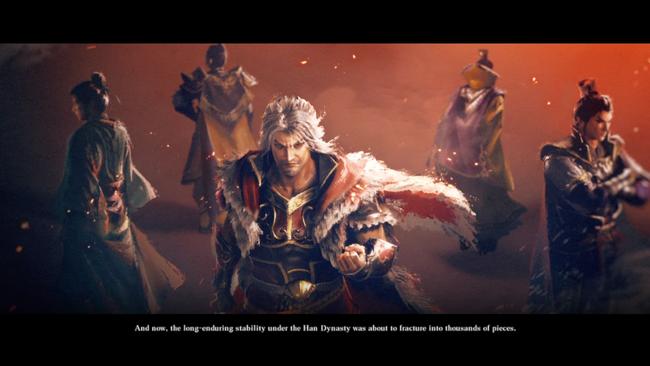
There are two beasts inside me that constantly yap about Dynasty Warriors: Origins. One of them is the hardened series veteran that loved the massive roster, mode variety, and arcade-like progression swiftly going from stage-to-stage to finish each character’s story mode. The other embraces Origins’ reinvention through taking a step back and presenting the Romance of the Three Kingdoms tale in a more intricate, detailed manner similar to how RPGs unfold their stories.
Unlike the previous entries’ huge selections of different characters from each faction, Dynasty Warriors: Origins only features one persistent playable character - the most typical, generic RPG archetype that’s silent and an amnesiac. This character eventually gets referred to as Ziluan frequently, so I’ll refer to him as that henceforth. Ziluan… doesn’t have much of a personality, either; he is merely a vessel for the game’s massive cast to educate people on the Romance of the Three Kingdoms story. Ziluan does have voiced phrases in battle, such as when he defeats an enemy officer, but is primarily unvoiced otherwise.
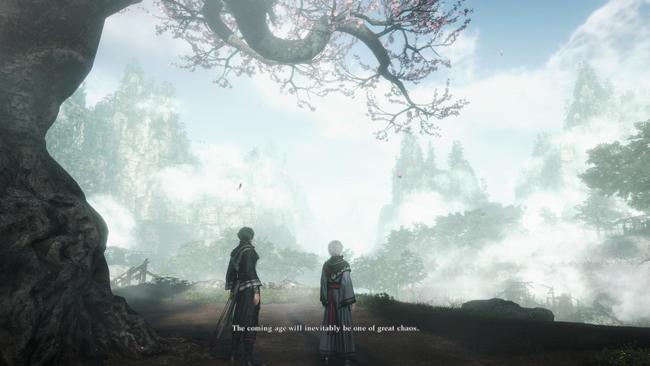
I can see why Omega Force decided to take this direction. The pacing of previous mainline games always tried to fit in the entire highlight reel of the Three Kingdoms from the Yellow Turban Rebellion to the Battle of Wuzhang Plains; eventually, they went beyond Wuzhang Plains when the Jin Dynasty was introduced in later entries. Therefore, it always had a hurried pace to feature the same story, same climatic moments, same iconic battles - yet all presented a bit differently due to new character designs and/or being on updated hardware. Of course, some entries introduced other features, such as extensive “what-if” routes and a customizable create-a-warrior pawn that rose through the ranks in some expansions of the games.
Thus, it became difficult to really convey the Romance of the Three Kingdoms in a thorough manner because more and more NPCs received unique designs and became playable characters, which continued to inflate the roster size. The amount of space to provide anyone with a bit of characterization or explanation of why they were involved in the conflict decreased overtime. A lot of the background exposition and in-between events were either relegated to mid-battle conversations/monologues, or a series of brief scenes in stage intermissions.
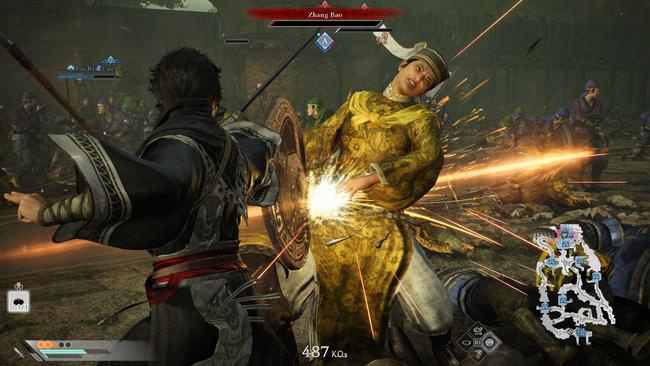
Players were always served a sliced version of the events through their chosen character’s point-of-view, which would then lead them to having to form a mental jigsaw puzzle of the entire picture if they weren’t already familiar with the original Romance of the Three Kingdoms tale. Depending on how relevant that character was, some story routes would last only 4-5 stages while others that stuck around from the very beginning had much more stages they participated in - and of course, there were only handful of stages in each entry, so repetitive stages were an expected feature among the story modes of 40+ characters. I love the series, yet I’ll admit this was always one of its weaker points, and it only exacerbated as time went on.
So ironically enough, this is where Origins shines. Since players are locked into Ziluan, a neutral third-party wanderer, they’re able to see the entire Romance of the Three Kingdoms from a cohesive, coherent bird’s eye view. Characters from all factions open their hearts up to Ziluan in 1-on-1 bond events, so characters that were once playable in previous entries are, ironically, characterized better in Origins. They’re able to explain themselves - their reasons, goals, and aspirations in a more organic manner and in a context that the framework of previous Dynasty Warriors installments didn’t allow. It helps to better gain an understanding of why this era in ancient China became so divided, and why key figures decided to side with certain groups.
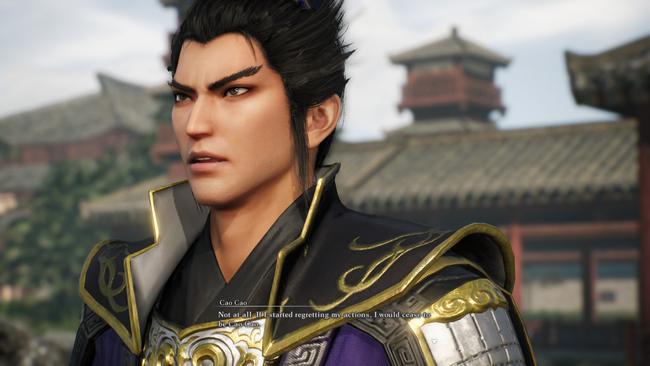
Origins also does a fantastic job building up to the tension between the legends that formed the Wei, Wu, and Shu Dynasties. It clearly paints a picture of the different ideologies that caused Cao Cao, the Sun family, and Liu Bei to go their separate ways after their joint alliances in earlier conflicts. The story inevitably branches as Ziluan will eventually have to pick a side, but newcomers now have a much more informed decision on who they want to support; other branching paths can be explored when the story rewind feature unlocks, after finishing one of the campaign routes.
Although players are locked to primarily playing Ziluan, they’ll come across a variety of new weapon types as they progress the story. Omega Force finally decided to stray away from the universal light attack string to heavy finisher combo system that the series was built upon for the last 24 years. Now, only the sword weapon type adopts this familiar system; meanwhile, every single other weapon type has its own exclusive mechanic that mixes up the formula.
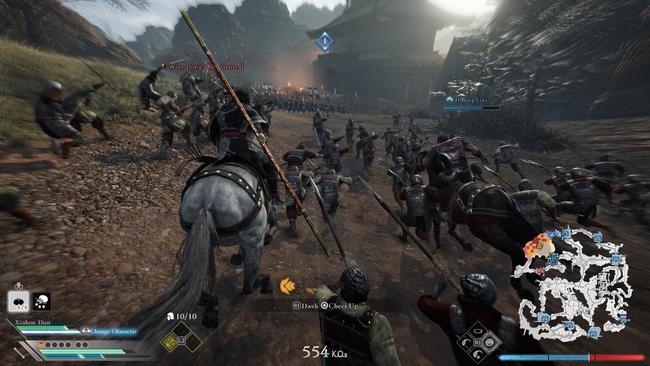
For instance, the dual rings’ heavy attack button tosses them out and upon catching them, Ziluan can follow it up with an even more devastating attack, if people correctly time pressing the heavy attack button at the moment of retrieval. The gauntlets let Ziluan’s fists do the talking as its heavy attack buttons lead to several different stances that have unique moves and finishers. If a person wants a bigger weapon, the massive crescent blade continually levels up as it sweeps through crowds and its skills gain new extensions, depending on its level when they were activated.
This variety leads to each weapon having inherent differences in strengths and weaknesses. I think Origins has the best moment-to-moment gameplay of the series yet. While Ziluan can’t change to another weapon type mid-combo, players can still pause the battle and equip him with another weapon in the middle of a stage.
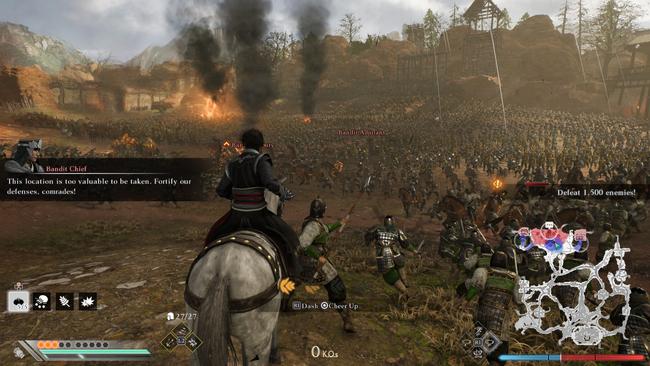
Battles in Origins are much more reminiscent of the stages in older Dynasty Warriors entries, rather than the seamless open-world that DW9 tried to pivot toward. Origins captures the ebb and flow of battles from earlier entries as morale plays a huge role in swinging the tide of battle; there is a huge emphasis on players working to push their allies forward, whether it’s through capturing bases or rescuing officers that are on the verge of retreating. Higher morale means that allies will perform better on their own and attempting to solo brute-force through massive enemy armies tends to be a huge undertaking.
The best moments in Origins are when gigantic armies collide with one another. It finally perfects the vision that the Dynasty Warriors series has strived for - the feeling of 1-vs-1000. In these instances, waves of bodies collide with one another as Ziluan carves his way through an ocean of soldiers with his blade. Numerous yelling of pained hits from hundreds of foes blend in with the raging buttrock music. I can’t stress enough how amazing these moments feel.
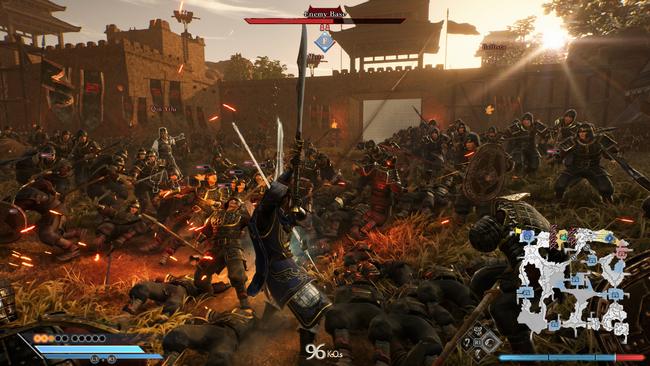
In some stages, Ziluan can take a companion with him. When their bar fills up, people can temporarily take control of these characters for a brief amount of time. These instances do understandably sting a bit for me, because it reminds me of what was lost on the road to Origins. There isn’t even a sandbox “Free Mode” like in earlier titles that allowed people to replay any stage with any character they wanted; there is no way in Origins to simply play as the other companions freely. Even then, that roster selection has been cut down considerably from over 90 in DW9 to… 10. Once again, I’ve understood and accepted what Origins is doing, but it’s hard not to see what was shed in the process as a long-time fan of this series.
As for what makes Origins more “qualified” as a RPG than its predecessors aside from its narrative structure, much of it boils down to its character progression systems. Ziluan continually raises his character level that raises his base stats of HP, attack, and defense. This is done by raising Ziluan’s proficiency levels of each weapon type; each weapon type earns experience points and “leveling” them up can extend their moveset or learn a new ability. The weapon “level-up” node is also then pooled into Ziluan’s overall character level to raise his stats. New skill trees open up when Ziluan achieves certain level thresholds that provide more stat increases, boost health recovery performance, and other miscellaneous upgrades.
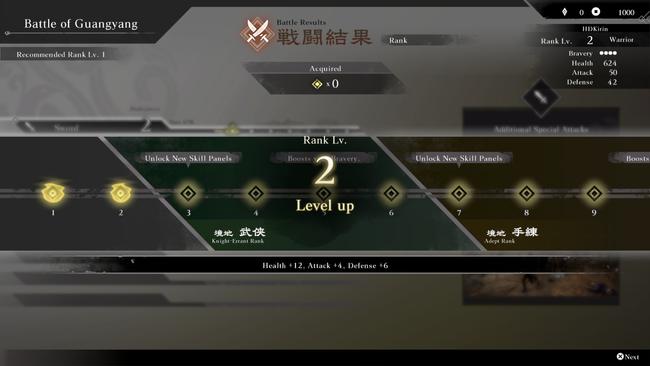
One of the more intriguing returning features from earlier Dynasty Warriors entries in Origins are bodyguards. Players eventually gain a small group of dedicated NPCs that accompany them. They’re needed to take down structures like ballistas and archer towers; plus, bodyguards are also required to break into sealed bases. Additional guards recruited raises their maximum cap, and further power up exclusive tactical abilities, such as mounted charges, firing a volley of arrows, or even chucking huge rocks at a nearby group of enemies.
Bodyguards can be killed off during the course of a battle, and can be gradually replenished by staying inside an allied base. Each base will usually have a handful of pots containing health recovering meat buns, which becomes a limited resource in higher difficulties, since enemies can no longer drop them. This effectively turns bases into a valuable quasi supply chain at the Hero and unlockable Ultimate difficulty level because they are the most reliable way to replenish both bodyguards and meat buns.
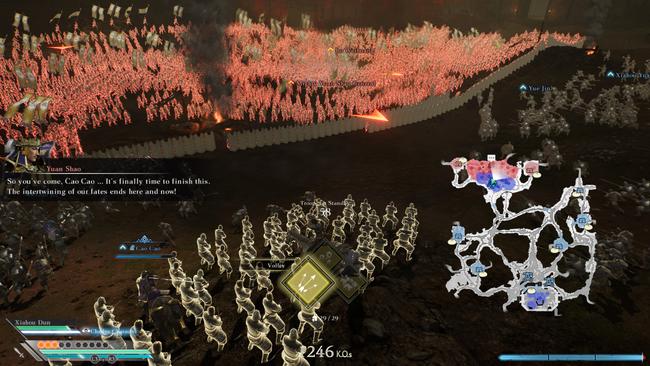
Furthermore, I adore how Origins handles its approach to endgame content that becomes available after one campaign route is completed. Aside from the aforementioned story rewind feature to play through the other factions’ stories, the Ultimate difficulty unlocks adds a lot of substantial replay value.
Playing a stage on Ultimate adds an additional, optional challenge objective that rewards players with additional in-game currency, more bodyguards, new weapon abilities, and most importantly - exclusive new powerful weapons. These challenges often ask players to approach the stage differently from what they would normally do, or test their skill by throwing themselves into unfavorable situations to meet a time limit requirement. It breathes new life into old stages and livens up the new stages throughout the other routes in a creative way that players can choose to opt into at any time.
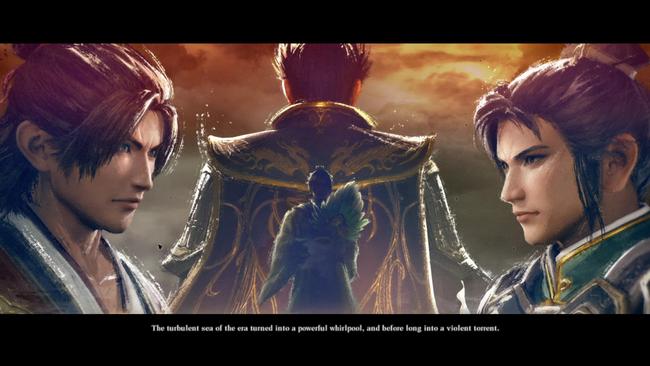
I ultimately come away from Dynasty Warriors: Origins with two opposing minds - one that yearns to return to its past glory filled with myriads of playable characters and modes, and another that is absolutely enamored with the reinvention of its framework in Origins. On one hand, Origins is a game that will disappoint mainline veterans that wanted a better version of what’s been done before; yet on the other hand, Origins is absolutely one of the smartest steps in the right direction to keep the series relevant and healthy in its future endeavors.
Think of it like this; if Omega Force decides to complete the Three Kingdoms story in Origins 2 and then releases the “proper” mainline Dynasty Warriors 10 title, the massive newer crowd coming from the Origins lineage is more likely to be way more interested in it now. They have a better understanding of the Romance of the Three Kingdoms story, and have developed a deeper appreciation of its overall cast. As a result, they are more likely to give this hypothetical DW10 a shot because they’ve cultivated this interest sparked by Origins.
Dynasty Warriors: Origins lays an important, fundamental groundwork for the future of the continued success of the Dynasty Warriors franchise. This is one of the most important junctures in time that will determine if the Dynasty Warriors series is still relevant, or if it will silently fade away like it almost permanently did after Dynasty Warriors 9. While I can absolutely empathize with how many long-time series fans feel about Origins’ slimmer package compared to past titles, I’ve chosen to embrace this impressive reinvention in the hopes that it is the harbinger of a new era of prosperity for the Dynasty Warriors series.